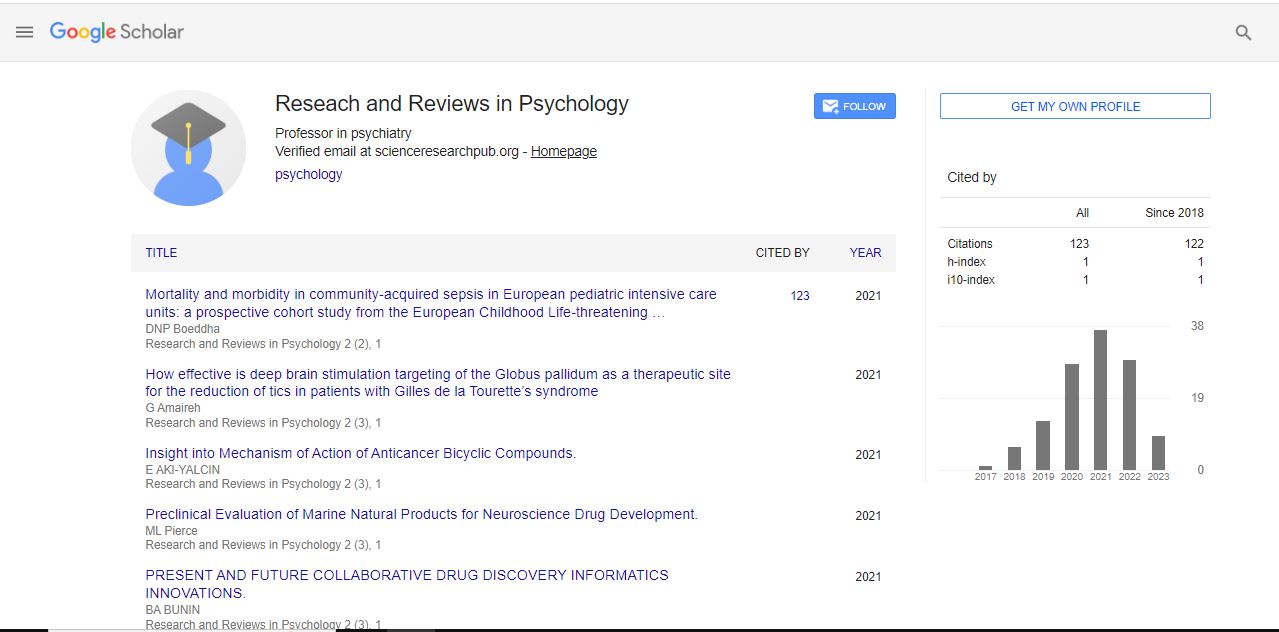Commentary, Res Rev Phys Vol: 4 Issue: 1
Mechanism of Cognitive Psychology in Patients
Galimberti Yoder*
Department of Psychology, Baldwin Wallace University, Berea, USA
*Corresponding Author: Galimberti Yoder
Department of Psychology, Baldwin Wallace University, Berea, USA
E-mail: yoder.g@gmail.com
Received: 03 March, 2023, Manuscript No. RRPY-23-93498; Editor assigned: 06 March, 2023, PreQC No. RRPY-23-93498 (PQ); Reviewed: 20 March, 2023, QC No. RRPY-23-93498; Revised: 27 March, 2023, Manuscript No. RRPY-23-93498 (R); Published: 06 April, 2023 DOI: 10.4172/rrpy.1000325.
Citation: Yoder G (2023) Mechanism of Cognitive Psychology in Patients. Res Rev Phys 4:1.
Description
Cognitive psychology is a sub discipline of psychology that focuses on the study of mental processes such as attention, memory, perception, problem-solving, and decision-making. It is concerned with how people process, store, and retrieve information in the brain. Cognitive psychology has origins in the neuroscience of the 1960s and 1950s, when the emphasis transformed from behaviorism to mental processes. The core concept of cognitive psychology is that mental processes can be analyzed objectively by using scientific methods. Cognitive functions are investigated by these kinds of investigators by using wide range of methods, including behavioral experiments, brain imaging studies, and computer simulations. One of the key areas of research in cognitive psychology is memory. Memory is the ability to retain and retrieve information over time. Cognitive psychologists study how memory works, how it can be improved, and it is affected by factors such as age, stress, and neurological disorders.
One power model of memory is the Atkinson-Shiffrin model, which indicates that memory consists of three components: Sensory memory, short-term memory, and long-term memory. Sensory memory is the first stage of memory, where information is briefly organized in its original sensory form. Short-term memory is the second stage, where information is held temporarily and actively processed. Long-term memory is the final stage, where information is stored indefinitely. Another area of research in cognitive psychology is attention. Attention is the ability to focus on a particular stimulus while rejecting others. These specialists analyses how recognition is allocated, maintained, and divided between environmental cues. Attention is critical for many cognitive processes, including perception, memory, and problem-solving.
Cognitive psychology also studies problem-solving and decisionmaking. Problem-solving involves finding a solution to a problem or achieving a goal, while decision-making involves choosing between different options. Specialists in this field study how people approach these tasks, what strategies they use, and how they make choices. One influential theory of problem-solving is the problem space theory, which proposes that problem-solving involves moving from an initial state to a goal state through a series of intermediate states. Researchers in cognitive psychology have used this theory to develop problemsolving strategies, such as means-ends analysis, which includes allocating a difficulty into more manageable sub-problems.
Cognitive psychology has also contributed to understanding of language. Language is a complex cognitive process that involves the production and comprehension of words spoken and written. Researchers in this field evaluate how language develops, how it is processed in the brain, and how neurological conditions can directly affect. Perception encompasses both the physical senses (sight, smell, hearing, taste, touch, and proprioception) and the cognitive processes involved in their interpretation. It is essentially how people become acquainted with their surroundings through the interpretation of stimulation.
Cognitive psychologists are primarily concerned with the mental processes that influence behavior. These processes include, but are not limited, the three stages of memory mentioned below:
• Sensory memory storage
• Short-term memory storage
• Long-term memory
 Spanish
Spanish  Chinese
Chinese  Russian
Russian  German
German  French
French  Japanese
Japanese  Portuguese
Portuguese  Hindi
Hindi 